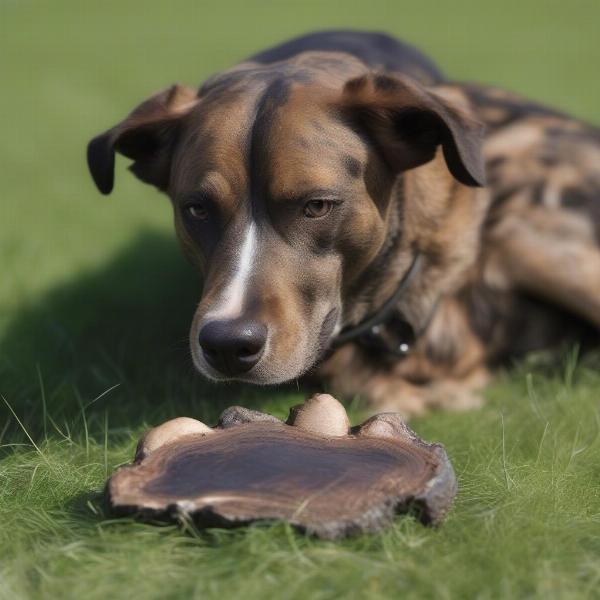Cow hooves are a popular chew treat for dogs, often touted for their natural composition and long-lasting chew time. But are they truly safe and healthy for our canine companions? This article delves into the pros and cons of cow hooves for dogs, addressing potential risks and benefits, and offering guidance on how to choose and use them responsibly.
Choosing the right chews for your dog can be overwhelming with so many options available. Understanding the potential benefits and risks associated with each type of chew is crucial for making informed decisions that prioritize your dog’s health and well-being. Cow hooves, while seemingly natural and appealing, come with their own set of considerations.
The Benefits and Risks of Cow Hooves for Dogs
Cow hooves can provide a satisfying chewing experience, helping to alleviate boredom and reduce destructive chewing behaviors in some dogs. The act of chewing also promotes good dental hygiene by scraping away plaque and tartar buildup. However, it’s crucial to be aware of the potential downsides.
One major concern is the hardness of cow hooves. While durable, this hardness can pose a risk of tooth fractures, especially in older dogs or those with pre-existing dental issues. Another potential hazard is splintering. Cow hooves can break into sharp shards that can injure a dog’s mouth, throat, or digestive tract.
 Dog chewing on a cow hoof
Dog chewing on a cow hoof
Furthermore, cow hooves are not easily digestible. Large pieces swallowed whole can cause gastrointestinal blockages, requiring veterinary intervention. They are also relatively high in fat, which can contribute to weight gain if given too frequently.
Choosing and Using Cow Hooves Safely
If you decide to give your dog a cow hoof, it’s crucial to choose the right size and supervise chewing sessions closely. Select a hoof that is appropriately sized for your dog’s breed and chewing habits. Too small, and it could become a choking hazard; too large, and it may be difficult for your dog to manage.
Always supervise your dog while they are chewing on a cow hoof. Remove the hoof if it becomes too small or starts to splinter excessively. Never leave your dog unattended with a cow hoof.
Are Cow Hooves Right for Your Dog?
Whether or not cow hooves are a suitable chew for your dog depends on individual factors such as age, dental health, and chewing habits. For senior dogs or those with dental issues, softer chews are generally recommended. Puppies should also avoid cow hooves as their teeth are still developing.
Consider your dog’s chewing style. If your dog is an aggressive chewer who tends to break things apart quickly, cow hooves may not be the best choice. Opt for safer alternatives like dental chews designed specifically for aggressive chewers.
Conclusion
While cow hooves can offer some benefits, the potential risks associated with their hardness and digestibility warrant careful consideration. Always prioritize your dog’s safety and well-being when choosing chews. Consult with your veterinarian if you have any concerns or questions about the suitability of cow hooves for your dog. Choosing safe and appropriate chews is a key component of responsible dog ownership.
FAQ
- Can puppies have cow hooves? No, cow hooves are not recommended for puppies due to their hardness and the risk of choking.
- What should I do if my dog swallows a large piece of cow hoof? Contact your veterinarian immediately.
- Are there any alternatives to cow hooves? Yes, there are many other chew toys available, including rubber toys, nylon bones, and dental chews.
- How often can I give my dog a cow hoof? Cow hooves should be given sparingly due to their high fat content. Treat them as an occasional treat rather than a daily chew.
- Can cow hooves help clean my dog’s teeth? While chewing can help scrape away some plaque, cow hooves are not a substitute for regular dental care.
- What size cow hoof is right for my dog? Choose a size appropriate for your dog’s breed and chewing habits. Consult the packaging or ask your veterinarian for guidance.
- Are smoked cow hooves safer than regular ones? No, smoking does not significantly alter the potential risks associated with cow hooves.
ILM Dog is a leading international website dedicated to providing reliable and practical information on dog care and breeding. Our experts cover a wide range of topics, including breed selection, health and medical care, training and behavior, nutrition, grooming, exercise, puppy care, senior dog care, traveling with dogs, and product reviews. For expert advice on the best products and accessories for your canine companion, explore our extensive resources on nutrition and feeding. Contact us at [email protected] or call us at +44 20-3965-8624. ILM Dog is your trusted source for all things dog-related.